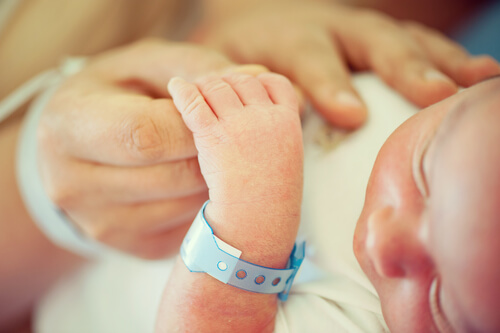The Development of Bones during the First Months of Life

The development of bones doesn’t occur fully once a baby is born. In fact, bones continue to grow well into childhood. In this article we’ll share with you the details of this incredible process.
Are you interested in knowing how the development of a baby’s bones occurs during the first months of life? The baby’s skeletal formation begins in the womb while the fetus develops.
Bones begin to form between the 15th to 20th week of gestation. The basic bone structures are completely formed around the 7th month of gestation.
Around the 7th month of gestation your baby has complete, soft and flexible bones that allow them to stay inside the womb comfortably until their birth.
The process however, doesn’t stop there. After birth, bone development continues to occur rapidly.
A baby’s skeletal system
A baby’s skeleton has 270 bones at the moment of birth. This figure changes a little since some of the bones of the skull fuse together while others appear in the wrist. At the end of the process as adults, we have 206 bones.
The development of the skeletal system occurs throughout life. However, the development of bones during the first months of life is different because it happens at a remarkably fast rate.
This is especially true during the first two years of childhood. Bones are formed by blood vessels, nerves, collagen and living cells called osteoblasts. Osteoblasts form the bone and osteoclasts are cells that feed the bone.
These living cells are what gives bones the ability to remodel themselves constantly. Osteoclasts get rid of old bone cells and replace them with new bone tissue that is more resistant and numerous.
This is what allows the body to grow. An individual’s growth can be influenced by various aspects from the moment of birth.
Factors that influence bone development during the first months of life
1. Genetics
Genetic potential is a hereditary factor that can influence up to 80% of a baby’s development as long as it’s not interrupted by external factors.
This means that if parents are tall, there is a high probability that their babies will grow up to be tall as well. This is also true if the parents are smaller. This factor begins to influence the child’s development after the age of two.

2. Food and nutrition
A fundamental factor that begins to take effect from the moment of fetal development is food and nutrition.
A balanced diet during pregnancy will assure the passage of nutrients through the placenta. This is directly related to the fetus’s growth and metabolic processes in the future.
After birth, the baby should be fed with breast milk until the age of 6 months. During breastfeeding, a mother’s diet should be balanced in order to provide all of the necessary nutrients for the baby’s development through her breast milk.
As the baby grows, they’ll need a complementary diet that will fulfill all of their needs.
3. Affection
This is a very important factor for a child’s growth. It has been proven that children who are deprived of affection tend to grow less.
This probably occurs because they’re depressed, and full of stress and anxiety. This has the power to affect their brain in the long term, causing it to produce large amounts of a hormone called somatostatin.
Somatostatin influences the secretion of growth hormones which are necessary for optimal development.
“A baby’s skeleton has 270 bones at the moment of birth. This figure changes a little since some of the bones of the skull fuse together. At the end of the process as adults, we have 206 bones”
4. Sleep
Rest is incredibly important for growth. The highest production of growth hormones occurs during the night. That’s why children are recommended to go to sleep early.
5. Physical exercise
Physical activity helps keep the mind and body healthy. Babies have to move around in order for their bones and muscles to develop resistance.
Children should have at least half an hour to play outdoors every day.

Physical activity also keeps the body in good conditions. Sunlight is also important for a child’s development. It allows the body to absorb vitamin D which is important for growth and the proper development of bones.
In conclusion, the development of bones in the first months of life is an important part of the little one’s integral development.
During this stage and for the rest of their lives, parents should make sure they provide all of the necessary aspects for the process to occur the way it should.
The development of bones doesn’t occur fully once a baby is born. In fact, bones continue to grow well into childhood. In this article we’ll share with you the details of this incredible process.
Are you interested in knowing how the development of a baby’s bones occurs during the first months of life? The baby’s skeletal formation begins in the womb while the fetus develops.
Bones begin to form between the 15th to 20th week of gestation. The basic bone structures are completely formed around the 7th month of gestation.
Around the 7th month of gestation your baby has complete, soft and flexible bones that allow them to stay inside the womb comfortably until their birth.
The process however, doesn’t stop there. After birth, bone development continues to occur rapidly.
A baby’s skeletal system
A baby’s skeleton has 270 bones at the moment of birth. This figure changes a little since some of the bones of the skull fuse together while others appear in the wrist. At the end of the process as adults, we have 206 bones.
The development of the skeletal system occurs throughout life. However, the development of bones during the first months of life is different because it happens at a remarkably fast rate.
This is especially true during the first two years of childhood. Bones are formed by blood vessels, nerves, collagen and living cells called osteoblasts. Osteoblasts form the bone and osteoclasts are cells that feed the bone.
These living cells are what gives bones the ability to remodel themselves constantly. Osteoclasts get rid of old bone cells and replace them with new bone tissue that is more resistant and numerous.
This is what allows the body to grow. An individual’s growth can be influenced by various aspects from the moment of birth.
Factors that influence bone development during the first months of life
1. Genetics
Genetic potential is a hereditary factor that can influence up to 80% of a baby’s development as long as it’s not interrupted by external factors.
This means that if parents are tall, there is a high probability that their babies will grow up to be tall as well. This is also true if the parents are smaller. This factor begins to influence the child’s development after the age of two.

2. Food and nutrition
A fundamental factor that begins to take effect from the moment of fetal development is food and nutrition.
A balanced diet during pregnancy will assure the passage of nutrients through the placenta. This is directly related to the fetus’s growth and metabolic processes in the future.
After birth, the baby should be fed with breast milk until the age of 6 months. During breastfeeding, a mother’s diet should be balanced in order to provide all of the necessary nutrients for the baby’s development through her breast milk.
As the baby grows, they’ll need a complementary diet that will fulfill all of their needs.
3. Affection
This is a very important factor for a child’s growth. It has been proven that children who are deprived of affection tend to grow less.
This probably occurs because they’re depressed, and full of stress and anxiety. This has the power to affect their brain in the long term, causing it to produce large amounts of a hormone called somatostatin.
Somatostatin influences the secretion of growth hormones which are necessary for optimal development.
“A baby’s skeleton has 270 bones at the moment of birth. This figure changes a little since some of the bones of the skull fuse together. At the end of the process as adults, we have 206 bones”
4. Sleep
Rest is incredibly important for growth. The highest production of growth hormones occurs during the night. That’s why children are recommended to go to sleep early.
5. Physical exercise
Physical activity helps keep the mind and body healthy. Babies have to move around in order for their bones and muscles to develop resistance.
Children should have at least half an hour to play outdoors every day.

Physical activity also keeps the body in good conditions. Sunlight is also important for a child’s development. It allows the body to absorb vitamin D which is important for growth and the proper development of bones.
In conclusion, the development of bones in the first months of life is an important part of the little one’s integral development.
During this stage and for the rest of their lives, parents should make sure they provide all of the necessary aspects for the process to occur the way it should.
This text is provided for informational purposes only and does not replace consultation with a professional. If in doubt, consult your specialist.








